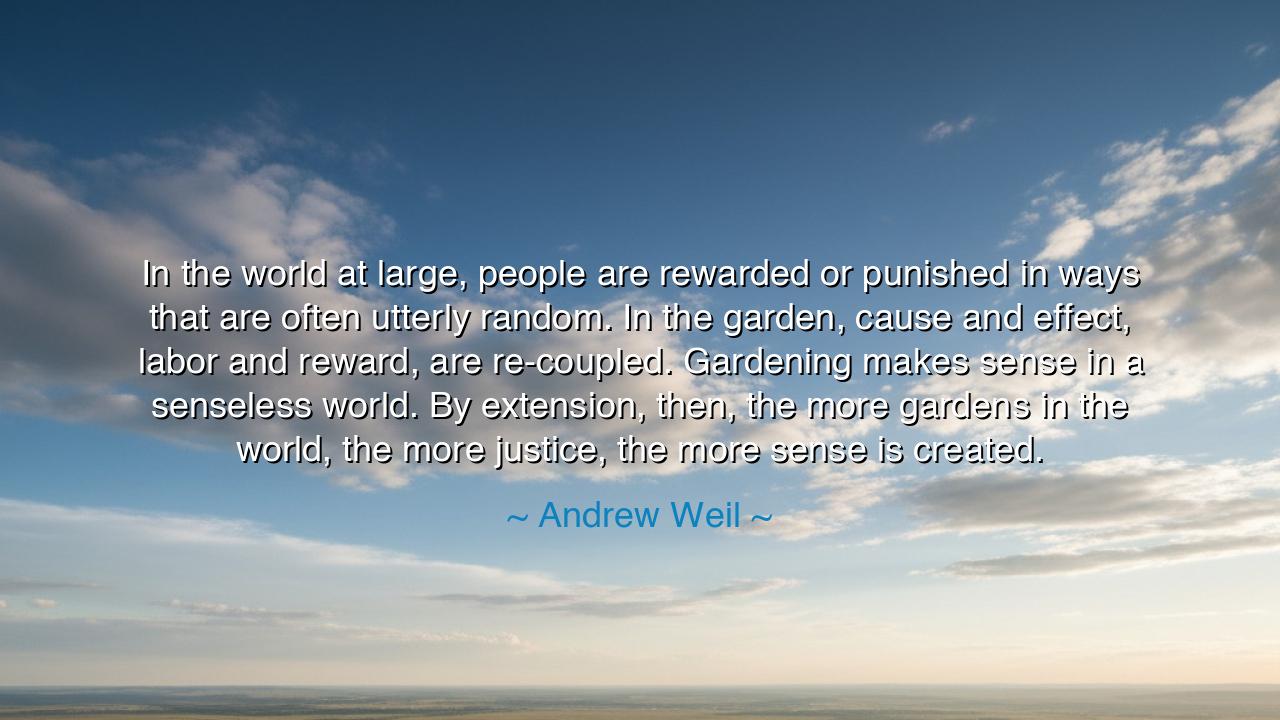
In the world at large, people are rewarded or punished in ways
In the world at large, people are rewarded or punished in ways that are often utterly random. In the garden, cause and effect, labor and reward, are re-coupled. Gardening makes sense in a senseless world. By extension, then, the more gardens in the world, the more justice, the more sense is created.






In a world that often seems shrouded in uncertainty and chaos, there lies a place where order and purpose emerge from the soil itself. Andrew Weil speaks a deep truth when he says, "In the world at large, people are rewarded or punished in ways that are often utterly random. In the garden, cause and effect, labor and reward, are re-coupled. Gardening makes sense in a senseless world. By extension, then, the more gardens in the world, the more justice, the more sense is created." These words resonate with the timeless wisdom of the ancients, who understood that the garden, a sacred space of growth and cultivation, is a microcosm of the larger world. In it, the gardener experiences the profound balance of effort and outcome, a balance that is often absent from the uncertainties of life.
The ancient Greeks, with their deep reverence for order in the universe, would have understood Weil’s insight. To them, the world was governed by a divine logos, a rational principle that ordered the cosmos. In their gardens, the act of planting was seen not just as a means of sustenance, but as a way to participate in the cosmic order. A garden was a reflection of the universe itself—a space where the laws of nature could be observed and understood. It was in the tending of the land that the gardener could experience the justice of cause and effect, the labor of planting rewarded by the harvest. The work of the garden, like the work of the soul, was one of discipline and patience, and in it, the gardener found a sense of meaning that the chaos of life often denied.
Weil’s observation about the randomness of life echoes the ancient teachings of the Stoics, who understood the unpredictable nature of the world. The Stoic philosopher Epictetus often spoke of the fact that life is full of events beyond our control. We cannot dictate the circumstances that shape us, nor can we always determine the outcomes of our actions. However, what we can control, and what we must focus on, is our response to those circumstances. The garden, like the Stoic’s mindset, offers a space where effort and reward are not dictated by chance but by the gardener’s own will and the natural cycles of the earth. Here, in the soil, there is justice—one’s labor yields its fruit in a way that is not arbitrary, but a direct reflection of the gardener’s effort.
Just as the ancients viewed the act of gardening as an act of aligning oneself with the natural world, Weil’s words remind us that gardens offer a deep reconciliation between the randomness of the world and the inherent order in nature. When we labor in the earth, when we plant a seed and care for it with our hands, we are re-coupling the age-old relationship between cause and effect. The garden offers us a profound sense of justice—in it, the efforts we make are met with tangible results. There is no randomness in the garden. If the gardener waters the plant, it grows. If the gardener tills the soil, the earth becomes fertile. In this world of cause and effect, there is a clarity that the external world, with its unpredictability and injustice, often denies.
Consider the story of the great Mahatma Gandhi, who, during his time in South Africa and later in India, often sought refuge in the simplicity of gardening. Gandhi, a leader who fought tirelessly for justice and peace, recognized that the act of tending the soil was not only a physical labor but a spiritual practice. For him, the garden was a place where the chaotic struggles of the world could be transformed into something meaningful. In the garden, as in life, there were no shortcuts—only hard work, dedication, and faith that the seeds you planted would grow. In this, Gandhi found a source of peace, a way to reconcile the injustices of the world with the order and justice of the earth’s natural rhythms.
The deeper lesson in Weil’s words is this: when we tend to the earth, when we create gardens, we are not just transforming nature; we are transforming ourselves. Gardens are more than just spaces of beauty; they are sacred places where we reconnect with the fundamental principles of life: effort, patience, nurture, and reward. They remind us that, in a world often governed by randomness, there is still a place where our actions matter—where justice and meaning are not abstract concepts, but real and tangible.
Thus, let us follow Andrew Weil’s wisdom and cultivate more gardens in our lives, not just as a means to nourish our bodies, but as a means to nourish our souls. Whether we plant a single flower or tend a vast landscape, let us remember that in each act of gardening, we are bringing more order and justice into the world. The act of planting is an act of creation, of working in harmony with nature, and of restoring balance in a world that too often seems ruled by chance. By nurturing the earth, we nurture ourselves, and in doing so, we create a world that is more just, more meaningful, and more in tune with the rhythms of the cosmos.






AAdministratorAdministrator
Welcome, honored guests. Please leave a comment, we will respond soon